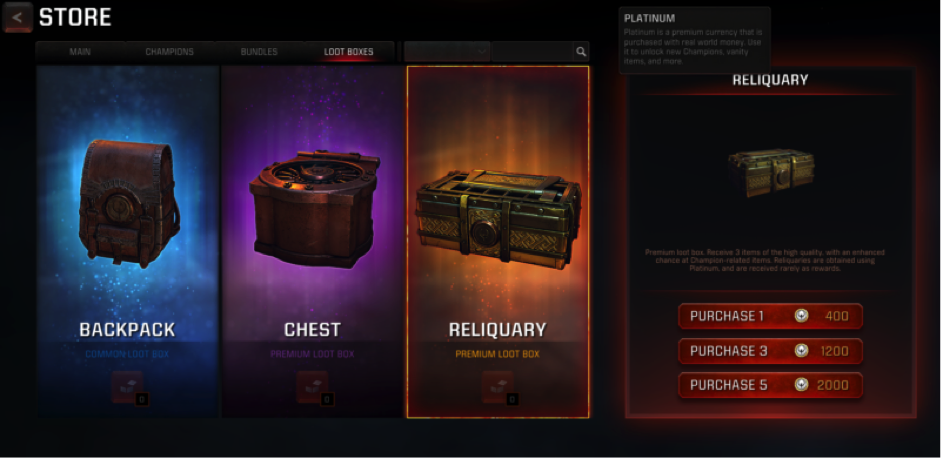Any foray into recent video games news and you’ll come across a ton of stories related to the use of loot boxes in games. Depending on who is writing the article, loot boxes are either the end of gaming as we know it, or a perfectly reasonable form of monetization that players aren’t forced to use.
What most people can agree on (with the exception of developers and the courts), is that loot boxes are a form of gambling. You pay money upfront for a percentage chance to win something of value. In which case, it’s not too far removed from buying a lottery ticket or spinning the roulette wheel.
All of which is prompting calls for authorities to clamp down on the use of loot boxes, but it remains a highly contentious issue with no immediate solution in sight.
Games and Monetization
Let’s be clear – monetization does not have to ruin a game. In fact, monetization is the only reason a lot of mobile-based freemium games exist. And it’s worth mentioning that while not all of them are the best quality, some of them are very, very good games.
Sadly, over-monetization is prevalent and it does dilute the quality of even AAA titles. Loot boxes for cosmetic skins are one thing, but locking content behind paywalls, pay-to-win mechanics, and so-called cut-content DLC are clear signs that a developer cares more about monetization than the player experience.
The line is fine, but it is there. And that’s why you’ll rarely hear anyone complaining that they have to trawl loot boxes for Hanzo’s completely optional Kabuki skin in Overwatch, but the very mention of Star Wars Battlefront II will have most gamers burning EA effigies in fits of rage.
It’s why CD Projekt Red, who doesn’t exactly have the best PR record in the world, has received major accolades recently for pledging not to hack Cyberpunk 2020 into tiny pieces and sell it back to gamers after they’ve already paid for the full game. Something that should really be the norm, not the exception.
The Lootbox Controversy
What makes loot boxes so deeply controversial is that they combine the issue of over-monetization with the risk of letting children gamble. Letting 13-year-olds bet on anything is something that no responsible casino or betting site would even think of doing.
And yet, research done by Massey University showed that out of twenty-two console games released between 2016 and 2017, ten contained loot box systems that ticked all the apt boxes for the five standard psychological criteria for gambling. Six of those ten games were certified as suitable for ages 13 and up.
The backlash against loot boxes has already begun, with Belgium, the Netherlands, Australia, China, South Korea, the UK, and certain US states taking steps to regulate or even ban them. However, given the financial benefits of loot boxes for developers, it’s not surprising that other forms of gambling in games have already popped up.
In their typical brash way, Rockstar went a step further than loot boxes and just put a straight-up casino in the middle of their GTA Online game. This means you can now take a break from running over other players just for the hell of it to play virtual Roulette, Blackjack or even have a little fun on their themed slot machines.
Gambling has also become a feature of the eSports scene, from the League of Legends world championship to CSGO betting.
A Case of Common Sense?
Theoretically, you could argue that the whole issue is relatively easy to solve. In fact, it’s little more than a case of basic common sense.
Think about it…
On one hand, you have various video games that now enable players of all ages (including children) to spend real money. In some instances, on complete unknowns that amount to gambling. But even in the cases where the ‘buyer’ knows exactly what they are purchasing, is it a good idea to let kids make purchases online?
Head over to any responsible online store and you’ll find the exact same policies in place. Not only do their terms and conditions specify that only adults aged 16/18/21 or over can purchase items from their stores, but also that their websites and content in general are not aimed at minors.
Kids are prohibited from making purchases online using credit cards, debit cards and so on. In which case, why are they not prohibited from making real-money purchases in general? Why is it that so many games seem to get away with practices that would land the average online retailer in quite a lot of trouble?
The Future of Gambling in Games
Currently, the future of gambling in games is uncertain and difficult to predict. Gambling on matches in eSports has little or no effect on the games themselves and is more a form of standard sports betting. However, opinions (both legal and social) on betting within games have yet to really crystalize.
The backlash on loot boxes that offer a pay-to-win option in AAA titles has led to a reduction in their use, but they are still prevalent when it comes to cosmetic goodies and upgrades for characters.
Video game developers are sensitive to player opinion, but the controversy around the unfinished nature of games like Fallout 76 and Anthem has demonstrated that this sensitivity tends to disappear when profits are on the line.
At the end of the day, the future of gambling in video games might be decided in the courts, with different jurisdictions deciding how to handle things for the benefit of their citizens. Until those decisions are made, loot boxes and other forms of in-game gambling look here to stay.
You might also find the following articles interesting:
- 10 Top Tips for Winning Big with Small Stakes
- 12 Woeful Ways to Waste Money As a Billionaire
- 5 Tips to Become a Better Poker Player














